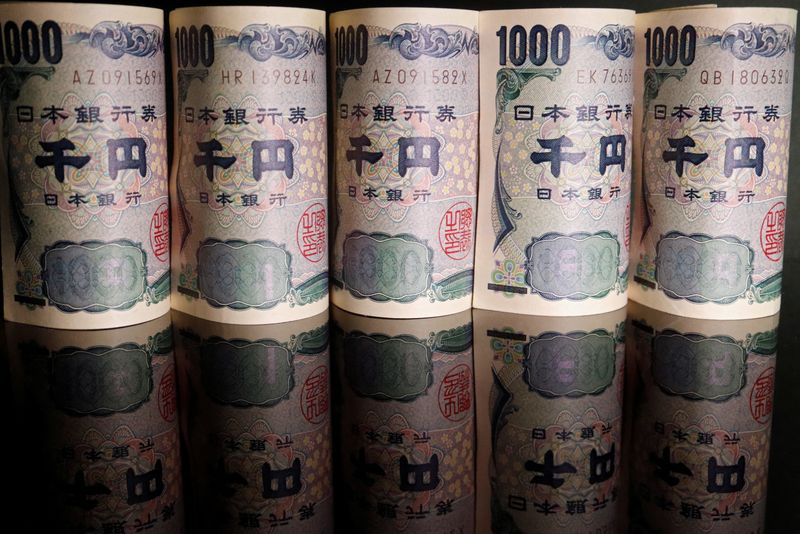By Satoshi Sugiyama
TOKYO (Reuters) - Japan's government and central bank will act to stop the yen's decline if it depreciates to the 145 per U.S. dollar level, more than half of economists polled by Reuters said.
Market participants closely watch how the government and the Bank of Japan (BOJ) respond to currency moves, following their meeting last month when the yen neared a six-month low and ahead of the central bank's rate review concluding on Friday.
While 96% of the poll's respondents expect the BOJ to maintain its policy this week, around half see a rollback of easing, including a tweak to the yield curve control (YCC) scheme, in either July or September.
Fifteen of 28 economists (54%) said the government and the BOJ will take steps such as issuing a warning or intervening into the currency market once the yen weakens beyond 145 per greenback, the June 8-13 poll found. Another 12 said 150 yen is the trigger.
"Domestic firms' weak-yen tolerance has improved thanks to strong tourist demand, but a sharp yen decline would torment manufacturers because soft overseas demand has made the benefit of a weak yen hardly visible", said S&P Global (NYSE:SPGI) Market Intelligence's Principal Economist Harumi Taguchi.
Analysts said the policymakers may weigh in if the yen weakens quickly, or if the depreciation is feared to prolong domestic inflation and squeeze households' purchasing power.
In a separate question on the weak yen's impact on BOJ policy, nine economists (31%) said the central bank's decisions could be swayed by a yen depreciation beyond 145 per dollar. Ten said 150 is the threshold, three opted for 155 and two chose 160 or further.
The BOJ, the finance ministry and the Financial Services Agency held a three-party talk on May 30, similar to another one last year that served as a prelude to Japan's first dollar-selling, yen-buying intervention in 24 years in September.
The yen hit a 32-year low near 152 to the dollar in October but then reversed course, as the government carried out additional interventions and the BOJ jolted the market with a surprise YCC tweak in December. The currency traded at 140.885 per dollar around midday on Thursday.
STAY ON COURSE, FOR NOW
The BOJ is expected to maintain ultra-loose monetary policy at the latest two-day meeting from Thursday, sources familiar with the bank's thinking have told Reuters.
In the poll, all but one - JP Morgan - out of 28 economists corroborated the view, citing an improved bond market functionality and Governor Kazuo Ueda's accommodative remarks so far.
Still, nearly two-thirds of respondents predicted the BOJ would scale back the current policy this year, although the margin has shrunk from 71% in last month's survey. The ratio of economists expecting an unwinding in July was largely unchanged at around 43%.
"July could be the best timing to tweak YCC, at the time of the BOJ's quarterly inflation forecast release and before the likely U.S. recession later this year", said Hiroshi Watanabe, senior economist at Sony (NYSE:SONY) Financial Group, who expects the BOJ to double the cap around the 10-year yield target to 1.0%.
Also, more than 70% of the economists polled said Japan's 2024 wage growth will likely remain at a level that is sufficient for the BOJ to consider ending or tweaking YCC.

Cautious Japanese firms offered annual wage hikes of more than 3% this year, a three-decade-high, given the need to lure workers amid high inflation and a labour crunch. BOJ's Ueda has said an end to easy policy would depend on the economy achieving 2% inflation coupled with pay growth.
(For other stories from the Reuters global long-term economic outlook polls package:)